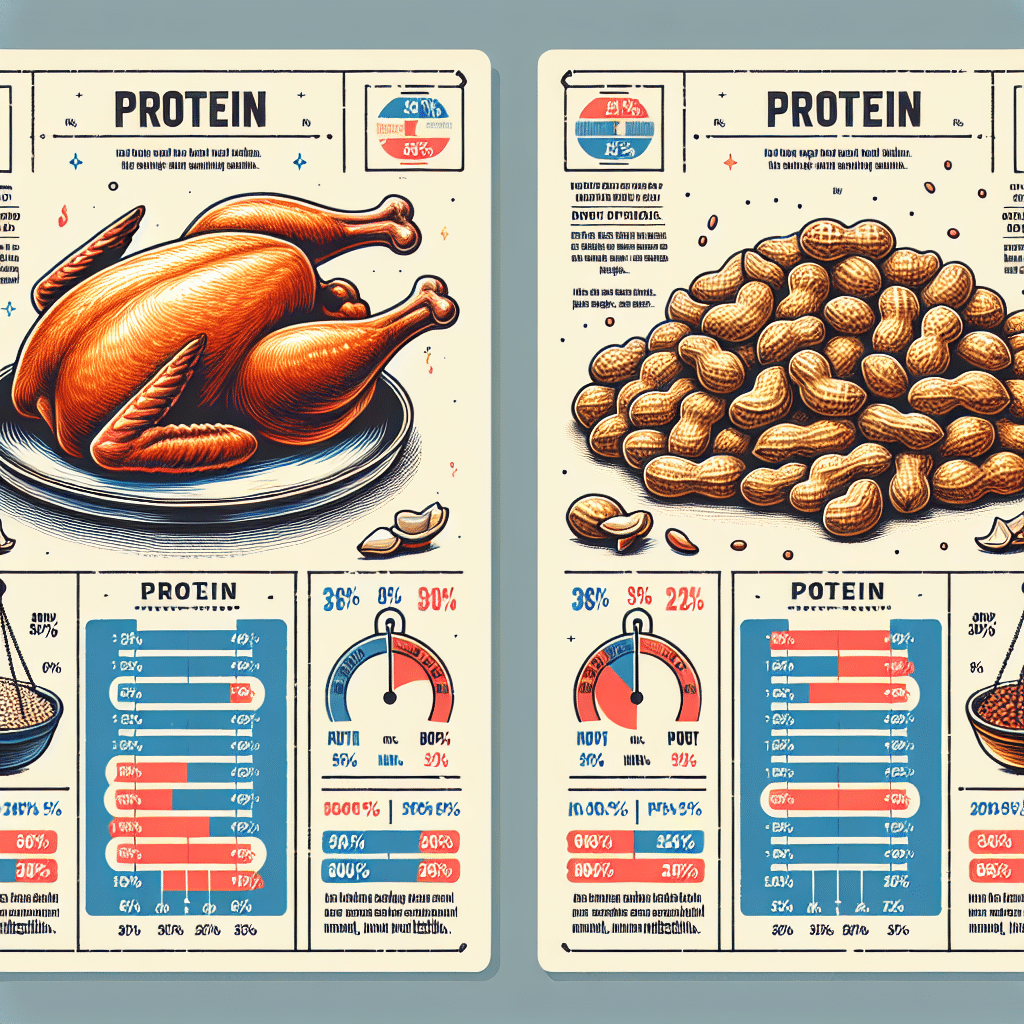Which Has More Protein Chicken Or Peanuts?
-
Table of Contents
- Chicken vs. Peanuts: Which Packs More Protein Punch?
- Understanding Protein Content
- Protein in Chicken
- Protein in Peanuts
- Nutritional Profiles: Chicken vs. Peanuts
- Chicken’s Nutritional Advantages
- Peanuts’ Nutritional Advantages
- Health Benefits and Considerations
- Health Benefits of Chicken
- Health Benefits of Peanuts
- Considerations When Choosing Protein Sources
- Conclusion: Balancing Your Protein Sources
- Discover ETprotein’s High-Quality Protein Products
Chicken vs. Peanuts: Which Packs More Protein Punch?

When it comes to protein sources, chicken and peanuts are both popular options for those looking to boost their intake. But which one offers more protein? This question is not just about quantity but also about quality, digestibility, and overall nutritional value. In this article, we’ll delve into the protein content of chicken and peanuts, compare their nutritional profiles, and explore the benefits and considerations of each.
Understanding Protein Content
Protein is a macronutrient essential for building and repairing tissues, making enzymes and hormones, and supporting overall health. It’s made up of amino acids, some of which are essential because our bodies cannot produce them and must obtain them from food.
Protein in Chicken
Chicken is a lean meat that is widely regarded as an excellent source of high-quality protein. It contains all nine essential amino acids, making it a complete protein. The protein content in chicken can vary depending on the cut. For example:
- Chicken breast: Approximately 31 grams of protein per 100 grams (3.5 ounces)
- Chicken thigh: Around 26 grams of protein per 100 grams
- Chicken drumstick: Roughly 28 grams of protein per 100 grams
These values can fluctuate based on factors such as cooking method and whether the skin is consumed.
Protein in Peanuts
Peanuts, despite being classified as a legume, are often compared to nuts in terms of their nutritional profile. They are a good source of plant-based protein, with the following content:
- Raw peanuts: About 25-28 grams of protein per 100 grams
- Peanut butter: Approximately 25 grams of protein per 100 grams
While peanuts contain a significant amount of protein, they are not a complete protein since they lack sufficient amounts of some essential amino acids, such as methionine.
Nutritional Profiles: Chicken vs. Peanuts
When comparing chicken and peanuts, it’s important to consider their entire nutritional profiles, not just their protein content.
Chicken’s Nutritional Advantages
Chicken is not only rich in protein but also low in fat, especially when the skin is removed. It provides important vitamins and minerals, including:
- Vitamin B6 and B12
- Niacin
- Phosphorus
- Selenium
- Iron
These nutrients play vital roles in energy production, immune function, and overall health.
Peanuts’ Nutritional Advantages
Peanuts offer more than just protein. They are also high in healthy fats, primarily monounsaturated and polyunsaturated fats, which are beneficial for heart health. Additionally, peanuts provide:
- Dietary fiber
- Vitamin E
- Magnesium
- Antioxidants such as resveratrol
The fiber content in peanuts can aid in digestion and promote satiety, which is helpful for weight management.
Health Benefits and Considerations
Both chicken and peanuts have their own set of health benefits and considerations that should be taken into account when choosing a protein source.
Health Benefits of Chicken
As a lean source of protein, chicken can help in muscle building and maintenance. It’s also beneficial for weight loss due to its high protein and low-fat content, which can increase feelings of fullness. The vitamins and minerals in chicken support various bodily functions and can contribute to a balanced diet.
Health Benefits of Peanuts
Peanuts can be a heart-healthy option due to their good fat content. The fiber in peanuts is beneficial for digestive health and can help regulate blood sugar levels. The antioxidants present in peanuts can combat oxidative stress and may reduce the risk of chronic diseases.
Considerations When Choosing Protein Sources
While both chicken and peanuts are nutritious, there are some considerations to keep in mind:
- Chicken should be cooked properly to avoid foodborne illnesses.
- Peanuts are high in calories, so portion control is important, especially for those watching their weight.
- Some individuals may be allergic to peanuts and should avoid them altogether.
- Choosing skinless chicken and unsalted, unprocessed peanuts can maximize health benefits.
Conclusion: Balancing Your Protein Sources
In conclusion, both chicken and peanuts are valuable sources of protein. Chicken provides a higher amount of complete protein with fewer calories, making it an excellent choice for those looking to build muscle or lose weight. Peanuts, on the other hand, offer additional nutrients like healthy fats and fiber but are higher in calories and not a complete protein.
The key takeaway is to balance your diet with a variety of protein sources to ensure you’re getting all the essential amino acids and other nutrients your body needs. Whether you prefer animal or plant-based proteins, both chicken and peanuts can be part of a healthy, balanced diet.
Discover ETprotein’s High-Quality Protein Products
If you’re looking to supplement your diet with additional protein, consider ETprotein’s range of organic and high-purity protein products. ETprotein specializes in producing and supplying top-tier organic bulk vegan proteins and L-(+)-Ergothioneine (EGT) to cater to various industries and dietary preferences.
With a commitment to non-GMO, allergen-free products, and a neutral taste profile, ETprotein ensures that you can find the perfect protein solution for your needs. Whether you’re involved in sports nutrition, weight management, or simply seeking to enhance your overall health and wellness, ETprotein has you covered.
Contact ETprotein today to learn more about their offerings and how they can support your protein requirements.
About ETprotein:
ETprotein, a reputable protein and L-(+)-Ergothioneine (EGT) Chinese factory manufacturer and supplier, is renowned for producing, stocking, exporting, and delivering the highest quality organic bulk vegan proteins and L-(+)-Ergothioneine. They include Organic rice protein, clear rice protein, pea protein, clear pea protein, watermelon seed protein, pumpkin seed protein, sunflower seed protein, mung bean protein, peanut protein, and L-(+)-Ergothioneine EGT Pharmaceutical grade, L-(+)-Ergothioneine EGT food grade, L-(+)-Ergothioneine EGT cosmetic grade, L-(+)-Ergothioneine EGT reference grade and L-(+)-Ergothioneine EGT standard. Their offerings, characterized by a neutral taste, non-GMO, allergen-free attributes, with L-(+)-Ergothioneine purity over 98%, 99%, cater to a diverse range of industries. They serve nutraceutical, pharmaceutical, cosmeceutical, veterinary, as well as food and beverage finished product distributors, traders, and manufacturers across Europe, USA, Canada, Australia, Thailand, Japan, Korea, Brazil, and Chile, among others.
ETprotein specialization includes exporting and delivering tailor-made protein powder and finished nutritional supplements. Their extensive product range covers sectors like Food and Beverage, Sports Nutrition, Weight Management, Dietary Supplements, Health and Wellness Products, and Infant Formula, ensuring comprehensive solutions to meet all your protein needs.
As a trusted company by leading global food and beverage brands and Fortune 500 companies, ETprotein reinforces China’s reputation in the global arena. For more information or to sample their products, please contact them and email sales(at)ETprotein.com today.












